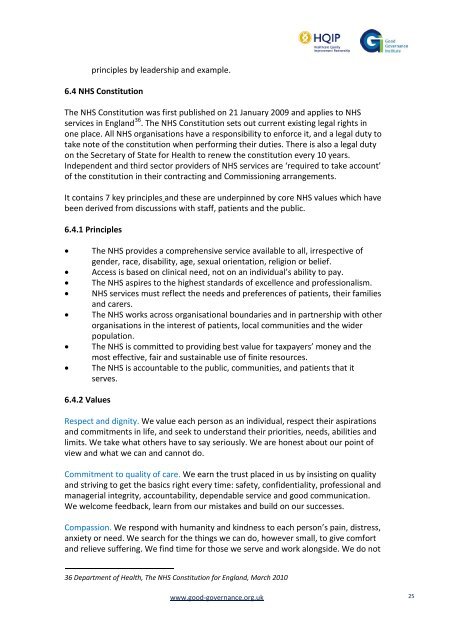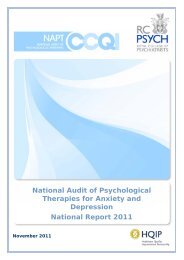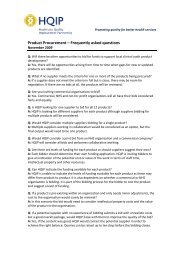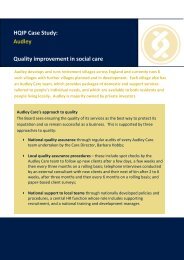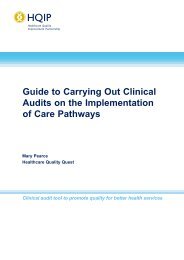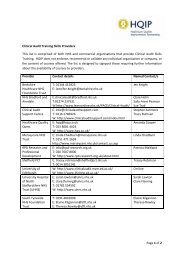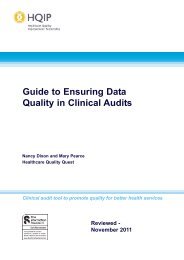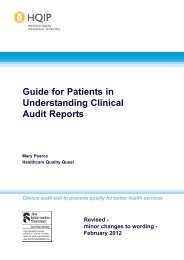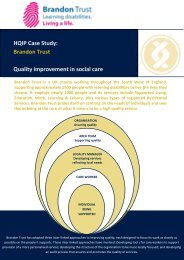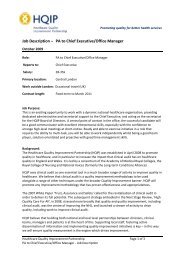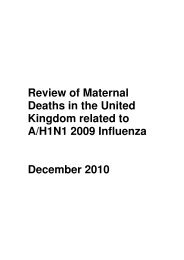Good Governance Handbook - HQIP
Good Governance Handbook - HQIP
Good Governance Handbook - HQIP
You also want an ePaper? Increase the reach of your titles
YUMPU automatically turns print PDFs into web optimized ePapers that Google loves.
principles by leadership and example.<br />
6.4 NHS Constitution<br />
The NHS Constitution was first published on 21 January 2009 and applies to NHS<br />
services in England 36 . The NHS Constitution sets out current existing legal rights in<br />
one place. All NHS organisations have a responsibility to enforce it, and a legal duty to<br />
take note of the constitution when performing their duties. There is also a legal duty<br />
on the Secretary of State for Health to renew the constitution every 10 years.<br />
Independent and third sector providers of NHS services are ‘required to take account’<br />
of the constitution in their contracting and Commissioning arrangements.<br />
It contains 7 key principles and these are underpinned by core NHS values which have<br />
been derived from discussions with staff, patients and the public.<br />
6.4.1 Principles<br />
• The NHS provides a comprehensive service available to all, irrespective of<br />
gender, race, disability, age, sexual orientation, religion or belief.<br />
• Access is based on clinical need, not on an individual’s ability to pay.<br />
• The NHS aspires to the highest standards of excellence and professionalism.<br />
• NHS services must reflect the needs and preferences of patients, their families<br />
and carers.<br />
• The NHS works across organisational boundaries and in partnership with other<br />
organisations in the interest of patients, local communities and the wider<br />
population.<br />
• The NHS is committed to providing best value for taxpayers’ money and the<br />
most effective, fair and sustainable use of finite resources.<br />
• The NHS is accountable to the public, communities, and patients that it<br />
serves.<br />
6.4.2 Values<br />
Respect and dignity. We value each person as an individual, respect their aspirations<br />
and commitments in life, and seek to understand their priorities, needs, abilities and<br />
limits. We take what others have to say seriously. We are honest about our point of<br />
view and what we can and cannot do.<br />
Commitment to quality of care. We earn the trust placed in us by insisting on quality<br />
and striving to get the basics right every time: safety, confidentiality, professional and<br />
managerial integrity, accountability, dependable service and good communication.<br />
We welcome feedback, learn from our mistakes and build on our successes.<br />
Compassion. We respond with humanity and kindness to each person’s pain, distress,<br />
anxiety or need. We search for the things we can do, however small, to give comfort<br />
and relieve suffering. We find time for those we serve and work alongside. We do not<br />
36 Department of Health, The NHS Constitution for England, March 2010<br />
www.good-governance.org.uk 25


